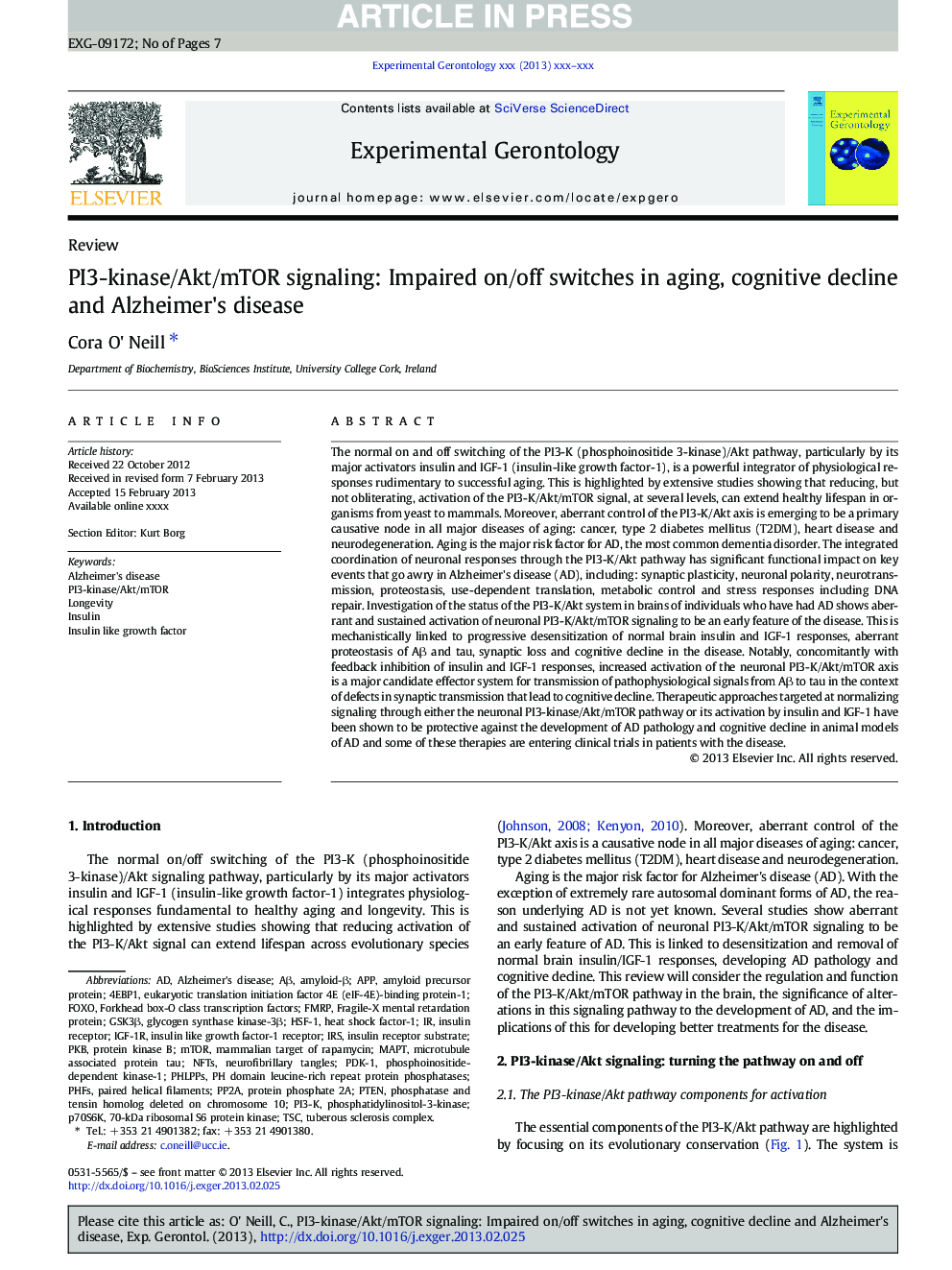| کد مقاله | کد نشریه | سال انتشار | مقاله انگلیسی | نسخه تمام متن |
|---|---|---|---|---|
| 10736871 | 1046275 | 2013 | 7 صفحه PDF | دانلود رایگان |
عنوان انگلیسی مقاله ISI
PI3-kinase/Akt/mTOR signaling: Impaired on/off switches in aging, cognitive decline and Alzheimer's disease
دانلود مقاله + سفارش ترجمه
دانلود مقاله ISI انگلیسی
رایگان برای ایرانیان
کلمات کلیدی
GSK3βFragile-X Mental Retardation ProteinPHFSHSF-1PDK-14EBP1PKBIGF-1RMAPTNFTsPI3-KFMRPp70S6KAPPIRSTSCAβPP2AmTORLongevity - دیرزیستی یا طول عمرamyloid-β - آمیلوئید βinsulin - انسولینinsulin receptor substrate - انسولین بستر گیرندهinsulin like growth factor - انسولین مانند عامل رشدAlzheimer's disease - بیماری آلزایمرPaired helical filaments - رشته های مارپیچ دوزی شدهHeat shock factor-1 - فاکتور شوک حرارت 1FoxO - فاکسوphosphatase and tensin homolog deleted on chromosome 10 - فسفاتاز و هومولوگ تنسین حذف شده در کروموزوم 10phosphatidylinositol-3-kinase - فسفاتیدیلینواستیل-3-کینازneurofibrillary tangles - مگس های نوروفیبریلیالmammalian target of rapamycin - هدف پستانداران رپامایسینPhosphoinositide-dependent kinase-1 - وابسته به فسفوینوزیته kinase-1Microtubule associated protein tau - پروتئین پروتئینی مرتبط با میکرو توبولamyloid precursor protein - پروتئین پیش ماده آمیلوئیprotein kinase B - پروتئین کیناز BPten - ژن PTENTuberous sclerosis complex - کمپلکس توبروس اسکلروزیسGlycogen synthase kinase-3β - گلیکوزین سنتاز کیناز 3βinsulin receptor - گیرنده انسولین
موضوعات مرتبط
علوم زیستی و بیوفناوری
بیوشیمی، ژنتیک و زیست شناسی مولکولی
سالمندی
پیش نمایش صفحه اول مقاله

چکیده انگلیسی
The normal on and off switching of the PI3-K (phosphoinositide 3-kinase)/Akt pathway, particularly by its major activators insulin and IGF-1 (insulin-like growth factor-1), is a powerful integrator of physiological responses rudimentary to successful aging. This is highlighted by extensive studies showing that reducing, but not obliterating, activation of the PI3-K/Akt/mTOR signal, at several levels, can extend healthy lifespan in organisms from yeast to mammals. Moreover, aberrant control of the PI3-K/Akt axis is emerging to be a primary causative node in all major diseases of aging: cancer, type 2 diabetes mellitus (T2DM), heart disease and neurodegeneration. Aging is the major risk factor for AD, the most common dementia disorder. The integrated coordination of neuronal responses through the PI3-K/Akt pathway has significant functional impact on key events that go awry in Alzheimer's disease (AD), including: synaptic plasticity, neuronal polarity, neurotransmission, proteostasis, use-dependent translation, metabolic control and stress responses including DNA repair. Investigation of the status of the PI3-K/Akt system in brains of individuals who have had AD shows aberrant and sustained activation of neuronal PI3-K/Akt/mTOR signaling to be an early feature of the disease. This is mechanistically linked to progressive desensitization of normal brain insulin and IGF-1 responses, aberrant proteostasis of Aβ and tau, synaptic loss and cognitive decline in the disease. Notably, concomitantly with feedback inhibition of insulin and IGF-1 responses, increased activation of the neuronal PI3-K/Akt/mTOR axis is a major candidate effector system for transmission of pathophysiological signals from Aβ to tau in the context of defects in synaptic transmission that lead to cognitive decline. Therapeutic approaches targeted at normalizing signaling through either the neuronal PI3-kinase/Akt/mTOR pathway or its activation by insulin and IGF-1 have been shown to be protective against the development of AD pathology and cognitive decline in animal models of AD and some of these therapies are entering clinical trials in patients with the disease.
ناشر
Database: Elsevier - ScienceDirect (ساینس دایرکت)
Journal: Experimental Gerontology - Volume 48, Issue 7, July 2013, Pages 647-653
Journal: Experimental Gerontology - Volume 48, Issue 7, July 2013, Pages 647-653
نویسندگان
Cora O' Neill,